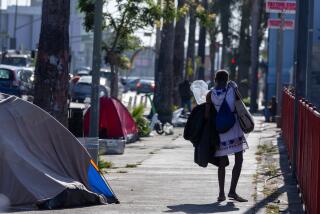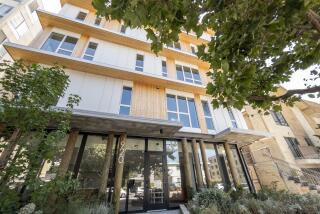Library Tax Proposal Is Slashed : Levy: Council reduces $6.8-million plan over fears that it would not get enough votes. A modest measure to make up for some cuts is offered.
PASADENA — The people spoke this week about the proposed $6.8-million tax for Pasadena’s libraries, and the message was clear: There aren’t enough votes to pass it.
The proposed special tax to provide “stable, long-range funding for the library,” as one library official put it, drew roughly equal numbers of proponents and opponents to an overflow City Council hearing Tuesday.
Of 52 speakers, 28 spoke against the tax, 24 spoke for it. But passage of the measure--in a special election planned for June--would require a two-thirds majority.
“A two-thirds vote--that’s extremely difficult to get,” Mayor Rick Cole said. “You need an overwhelming turnout.”
Council insiders said Tuesday that voter turnout in support of the tax measure would be considerably less than two-thirds.
With representatives of the Pasadena Chamber of Commerce and the Pasadena Board of Realtors attacking the tax as being anti-business, chastened council members all but abandoned the proposal. A majority voted instead to ask the city attorney to draw up a modest measure to raise just enough revenue to cover recent library cutbacks--about $800,000.
Meanwhile, City Manager Philip Hawkey will report on what next year’s general fund budget--already at a lean $293 million, according to budget officials--will look like without additional tax money. City officials estimate that they will have to make about $13 million in additional spending cuts for the 1993-94 budget year.
For three years, the library budget has been shrinking like a sand dune in a cyclone, library officials say. Because of a shortage of funds, the Central Library has closed its doors on weekday mornings and all day on Mondays, the eight branch libraries’ days of service have been reduced from five to four, almost two-thirds of the funds for new books have been eliminated, and community service programs have either been scrapped or drastically cut.
Even after library employees decided to give up about $100,000 in raises last year, the library budget shrank from about $7.1 million in 1989 to $6.3 million this year.
Facing the prospect of even deeper cuts next year, a citizens task force wrestled with the problem for three months. The group’s proposed tax plan would have cost an extra $96 for each single-family home in the city and $60 for each apartment. Commercial properties would have been taxed an extra 10 cents per square foot.
But the task force misread the city’s electorate, several council members said Tuesday.
“We had mountains of technical analysis but no electoral analysis,” Councilman Isaac Richard said.
There was clearly a lot of support for the tax. More than 100 proponents showed up Tuesday, some of them carrying placards with pro-library slogans.
“Right now, our library system is on fire,” said writer and television personality Digby Diehl, a Pasadena resident. “It is being destroyed just as surely as if some maniac were pouring gasoline and dropping matches on the bookshelves.”
“I am surprised that it has come to this kind of a crisis about the libraries,” said Barbara Double, representing the Friends of La Vina Library. “It is one of the defining institutions of Pasadena--as much as Caltech, JPL, the Pasadena Playhouse or the Tournament of Roses.”
But others spoke of the sputtering Southern California economy and existing tax hardships.
“We are inundated with taxes--excise taxes, real estate taxes, gas taxes, income taxes,” Lanny Aplanalp said. “We are taxed to our teeth.”
“I think this is criminal,” said James Hague, describing himself as “an average middle-class homeowner.”
“It’s legalized theft,” he added. “There’s a crisis in the city because of mismanagement. This has to be addressed first, before we’re hit with additional taxes.”
Bill York, a former member of the city’s Planning Commission, predicted that the measure would be opposed by the poor, by longtime property owners whose property taxes have been kept low by Proposition 13 restrictions and by homeowners such as himself who can afford the tax but object to the council’s methods.
“It doesn’t have a ghost of a chance of passing,” he said.
Tax proponents argued that it would actually be good for business and property values.
“Businesses have located here because of the quality community that it is,” including its library system, Eugene Fingerhut said.
But in the end, only one of six council members present--Jess Hughston, who is scheduled to leave office next month--said he would vote for the tax measure without modifications.
Council members Katherine Nack and William Paparian asked for more information, and Cole and Councilman Chris Holden favored the reduced approach of raising just enough money in new taxes to reopen on weekday mornings and restore other service cuts.
Richard, arguing that his low-income constituents in northwest Pasadena have been hurt the most by budget cuts, proposed a progressive assessment district tax, with most of the burden falling upon the city’s upper-income taxpayers.
Ultimately, four of the six city legislators voted for the $800,000 gap-covering measure, with Richard and Nack opposing it.
The council will vote on the final language of a tax measure in two weeks in time to schedule a special election for June 29.
More to Read
Sign up for Essential California
The most important California stories and recommendations in your inbox every morning.
You may occasionally receive promotional content from the Los Angeles Times.









